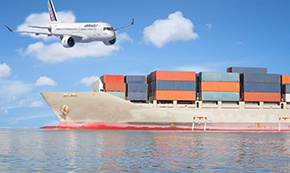All categories >
US court rules Trump's tariff policy exceeded authority, permanently prohibiting the implementation of "reciprocal tariffs"
Categories:
News Center
News
Time of issue:
2025-05-29 16:21
Views:
In the tide of globalization, the international trade landscape is constantly evolving. However, a recent major piece of news has drawn widespread attention: According to reports from the Associated Press and Reuters on May 28, the United States International Trade Court blocked the tariff policy announced by US President Trump on April 2, "Liberation Day," ruling that the policy was "ultra vires." This ruling undoubtedly dealt a major blow to US trade policy and presented new challenges and opportunities for many businesses, especially US-line shipping companies.
The Failure of Trump's Tariff Policy
The United States International Trade Court, located in New York, is primarily responsible for hearing lawsuits related to international trade and exercising jurisdiction over relevant administrative decisions. This court's ruling was based on the US Constitution's grant of exclusive power to Congress to regulate trade with other countries, and that the emergency powers invoked by the president to protect the US economy cannot override these powers.
Public information shows that the main responsibility of the United States International Trade Court is to hear lawsuits related to international trade and exercise jurisdiction over relevant administrative decisions. In 2020, 3600 American companies also requested that the Trump administration suspend tariff settlements on some Chinese products imported into the US, and ultimately won the lawsuit.
In addition, Trump's tariff policies are currently facing at least seven lawsuits. The lawsuit just ruled on by the US International Trade Court was filed by the non-profit, non-partisan litigation organization "Liberty Justice Center" on behalf of five small US businesses severely impacted by Trump's tariff policies. Six other lawsuits were filed by 13 US states and other small business groups.
The US International Trade Court released a 49-page ruling; below is a screenshot of the ruling:
The Trump administration has not yet responded to the news. But the media predicts that the Trump administration will appeal the ruling, as tariff policy is central to the Trump administration's economic policy.
Previously, on April 2, Trump signed an executive order issuing so-called "reciprocal tariffs" (often referred to as "Liberation Day tariffs" domestically in the US), claiming that America's long-standing trade deficit was "unfair." The Trump administration has also imposed additional tariffs on products from China, Canada, and Mexico under various pretenses. But the US International Trade Court's ruling is a major blow to Trump's tariff policy.
In court, the plaintiff's lawyer Schwab (Jeffrey Schwab) stated that although the Trump administration claims that the legal basis for its "reciprocal tariff" policy is the so-called International Emergency Economic Powers Act (IEPPA), tariffs are not among the means authorized by the IEPPA for presidential use. Even if tariffs were to be used based on this, the trade deficit does not meet the conditions of "unusual and extraordinary threat" stipulated in the regulations— The US has had a trade deficit with the rest of the world for 49 consecutive years.
The plaintiff's lawyer also stated, Trump's imposition of tariffs marks an "unprecedented and illegal expansion" of executive power, which was not the original intention of Congress when it passed the IEPPA.
Lawyers from the US Department of Justice, representing the defendant, argued that Congress authorized the president to handle foreign affairs and regulate trade, including the imposition of tariffs since 1794. However, conservative judge Restani refuted this claim, arguing that the long-standing (trade deficit) situation would not suddenly plummet to trigger the government to invoke a national emergency to such an extent.
In today's increasingly complex globalized world, Trump's attempt to unilaterally change the trade landscape through executive orders is not only likely to harm domestic businesses but is also difficult to sustain. These actions seem to be aimed at "Making America Great Again," but may ultimately burden small and medium-sized American businesses, complicate international trade relations, and even fail to gain acceptance from domestic courts.
The Trusted Choice, Your Professional US-Line Shipping Partner
In today's ever-changing global trade landscape, choosing a reliable US-line shipping partner is crucial. Shenzhen Huijietong International Freight Forwarding Co., Ltd., with its professional services, extensive experience, and efficient operations, has become the trusted choice for numerous clients. Whether you are a large enterprise or a small and medium-sized enterprise, Huijietong can provide logistics solutions to meet your needs. Choosing Huijietong means choosing professional, efficient, and reliable logistics services.
The US International Trade Court's ruling on Trump's tariff policy is not only a major adjustment to US trade policy but also brings new challenges and opportunities for US-line shipping companies. Shenzhen Huijietong International Freight Forwarding Co., Ltd., with its professional services and extensive experience, demonstrates strong resilience in the face of trade policy fluctuations. In the US-line shipping industry, Huijietong is always your trusted partner.
For more details, please visit Welcome to consult
WeChat QR Code
Service Hotline: 0755-82171929 13560787209
For US routes, choose Huijietong! Official website: https://www.szvif.com/
Shenzhen Huijietong International Freight Forwarding Co., Ltd., your professional US-line shipping partner.
Keywords:










